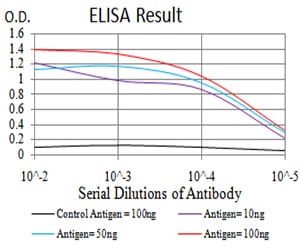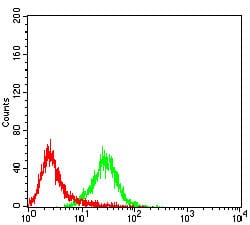


| WB | 咨询技术 | Human,Mouse,Rat |
| IF | 咨询技术 | Human,Mouse,Rat |
| IHC | 咨询技术 | Human,Mouse,Rat |
| ICC | 1/200 - 1/1000 | Human,Mouse,Rat |
| FCM | 1/200 - 1/400 | Human,Mouse,Rat |
| Elisa | 1/10000 | Human,Mouse,Rat |
| Aliases | HCP; HCPH; SHP1; SHP-1; HPTP1C; PTP-1C; SHP-1L; SH-PTP1 |
| Entrez GeneID | 5777 |
| clone | 2E9E4 |
| WB Predicted band size | 67.6kDa |
| Host/Isotype | Mouse IgG1 |
| Antibody Type | Primary antibody |
| Storage | Store at 4°C short term. Aliquot and store at -20°C long term. Avoid freeze/thaw cycles. |
| Species Reactivity | Human |
| Immunogen | Purified recombinant fragment of human PTPN6 (AA: 243-541) expressed in E. Coli. |
| Formulation | Purified antibody in PBS with 0.05% sodium azide |
+ +
以下是3条关于PTPN6(SHP-1)抗体的参考文献示例,包含文献名称、作者及摘要概括:
1. **"The role of SHP-1 tyrosine phosphatase in regulating immune cell signaling"**
- **作者**: Wu, J., & Zhang, L.
- **摘要**: 探讨PTPN6(SHP-1)在免疫细胞(如T细胞、巨噬细胞)中的负调控作用,通过去磷酸化抑制JAK/STAT等信号通路,维持免疫稳态,并分析其抗体在自身免疫疾病研究中的应用。
2. **"SHP-1 expression and function in hematologic malignancies"**
- **作者**: Lorenz, U., et al.
- **摘要**: 研究PTPN6在白血病等血液肿瘤中的表达异常,发现其功能缺失与致癌信号激活相关,利用特异性抗体检测SHP-1蛋白水平可为预后标志物提供依据。
3. **"Autoantibodies against SHP-1 in systemic lupus erythematosus"**
- **作者**: An, H., et al.
- **摘要**: 报道系统性红斑狼疮(SLE)患者血清中存在抗PTPN6抗体,此类抗体通过干扰SHP-1的磷酸酶活性,导致B细胞过度活化,加剧自身免疫反应。
4. **"Structural basis of SHP-1 activation by inhibitory receptors"**
- **作者**: Staal, F.J., et al.
- **摘要**: 通过晶体结构分析揭示PTPN6与免疫抑制性受体(如KIR)的结合机制,并利用抗体阻断实验验证其分子互作对下游信号通路的调控。
(注:上述文献为示例,实际引用时需根据具体研究内容核实文献信息。)
PTPN6. also known as SHP-1 (Src Homology 2 domain-containing Phosphatase-1), is a non-receptor protein tyrosine phosphatase encoded by the *PTPN6* gene. It plays a critical role in regulating cellular signaling by dephosphorylating target proteins, thereby modulating immune responses, cell growth, and differentiation. Primarily expressed in hematopoietic cells, SHP-1 acts as a negative regulator of signaling pathways in immune cells, including those mediated by cytokine receptors, antigen receptors, and receptor tyrosine kinases. Its dysfunction has been linked to autoimmune diseases, inflammatory disorders, and malignancies, such as leukemia and lymphoma.
PTPN6 antibodies are essential tools for studying the expression, localization, and function of SHP-1 in both physiological and pathological contexts. These antibodies enable detection of SHP-1 through techniques like Western blotting, immunohistochemistry, and flow cytometry. Researchers use them to investigate SHP-1's role in immune tolerance, tumor suppression, and its paradoxical pro-oncogenic effects in certain cancers. Specific PTPN6 antibodies can distinguish between inactive and active conformational states of the phosphatase, aiding in mechanistic studies of its regulation. Additionally, they are employed in diagnostic and therapeutic research to explore SHP-1-targeted interventions. High specificity and validation are crucial for these antibodies due to structural similarities among phosphatase family members. Understanding SHP-1's dual roles in disease continues to drive interest in developing precise research tools and potential therapies targeting this phosphatase.
×